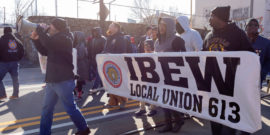A rule of law that is worthy of the name does not play favorites, and this insight remains one of the highest ideals of classical liberalism.
A Master of Disaster: James Crosby and the Failure of HBOS Bank
On 3 December the British liberal newspaper, the Guardian, reported the apology issued to the world by the former chief executive of HBOS, a large British bank that collapsed during the financial crisis to the development of which its own conduct had made its own contribution.
James Crosby, the chief executive, admitted that the collapse of the bank was caused by incompetence, not least his own; but there were clearly limits to his sense of guilt for it has not so far caused him to repudiate his $800,000 a year pension; and no doubt he would justify this limited reach of his conscience by pointing out that ruining a bank is actually very hard work, which only a small elite are able to perform. No one ever suggested that he was lazy; indeed, he probably worked labored mightily, even at breakfast, for many years. Would that he hadn’t.
To everyone outside the charmed circle of fantastically-rewarded bank-wreckers, however, this looks suspiciously like an example of market failure. Surely, capitalism is supposed to reward success and penalize failure, financially if not judicially? For 99.99 per cent of the population, a pension of $800,000 a year would appear like a handsome reward. But the case of James Crosby, who ought in justice to be living on bread and water for the rest of his life unless he takes up employment as, say, an office cleaner, and who is by no means a unique or even the worst example of the incompetent with a Midas touch where his own affairs are concerned, will strengthen the arguments of those who are viscerally hostile to capitalism, even while they ignore the looting of the public purse by rent-seeking public sector workers. For if Mr Crosby is not a failure, who is a failure? In fact, a general decline in probity and belief in the possibility of real economic enterprise has led to rent-seeking behavior of a similar nature in both the private and public sectors, with the tax-payer and the shareholder having their funds appropriated by people in a position to do so. At the same time, and not coincidentally, the mutual dependence of the public and private sector has led to a blurring of honest and dishonest conduct. Equivocation is now the norm.
The Guardian report on the Crosby case had a revealing short paragraph:
Crosby said he was “horrified and deeply upset by what happened” in 2008, when Lloyds [Bank] was forced to rescue HBOS and the enlarged bank had to be rescued with $32 billion of taxpayers’ cash.
Note ‘what had happened’ rather than ‘the results of what I and my cronies did.’ I was reminded of a man who stabbed his friend to death, and forever afterwards said ‘when he [his friend] met with his accident.’
Furthermore, we may ask who or what was the force that forced Lloyds Bank to rescue HBOS, and what kind of rescue it was that so soon required that the rescuer itself be rescued, this time with taxpayers’ cash – or rather, cash borrowed on the taxpayers’ behalf but without their consent, cash that was itself conjured out of thin air because the taxpayer actually has no cash in hand, only liabilities: the taxpayers’ intermediary or supposed agent, the government, being effectually bankrupt already even without the creation of the extra $32 billion of debt to fund the rescue of the rescuer.
The rescuer was, apparently, leaned on by the government (in effect an electoral dictatorship which can always find ways to make life difficult for the recalcitrant) to take over HBOS without knowing the extent of its bad debts. It had been, until then, a viable bank, even if it was not without one or two skeletons in its cupboard; and thus two banks were ruined for the price of one. Whether this was a better solution for the economy, taken in the round, than allowing only one bank to collapse is a matter of opinion; certainly the shareholders in Lloyds Bank, until then thought of as a blue chip company, would not have thought so. Indeed, they would have felt as if they had been expropriated without compensation.
The next question is why a bank of the size of HBOS was permitted to lend so incontinently. After all, the government had both the time and the inclination to regulate practically everything else, from the size of airbags in cars to the amount of time spent on arithmetic in schools.
As it happens, HBOS was not the only bank to lend in so incontinent a fashion: many others did so. Mr Crosby may have been incompetent, but it was a kind of incompetence of which the government clearly approved and encouraged. It suited its electoral purposes: for the illusory prosperity created by cheap credit and asset inflation was for it better than the veridical economic stagnation that would have been evident without it.
The tax revenue on illusory economic activity funded by debt permitted the government to increase its expenditure and thus its powers of control and patronage without appearing unduly to increase the national debt or its budgetary deficit. When the music stopped, however, and banks like HBOS collapsed, the government was left with giant wage bills and pension obligations – for that is what the increased revenues were used to find – and fewer taxes to pay them with. This is a problem that has not gone away five years later. The obligations cannot be met without further indebtedness.
No doubt Mr Crosby, at the peak of his incompetence, thought that he was one of the masters of the universe, a man of destiny. In fact he was a licensed trader, a pawn of the government, and his real function was to deceive the electorate as to the true economic state of the country, albeit by making it much worse in the long run. For this signal service to the government of his day he was highly, even grotesquely, rewarded.
As for the government of his day, it took its fundamental political principle from the ancien régime (as, seemingly, do all governments in modern democracies), that principle being après nous, le déluge.

